Commercial Law Assignment: Agency, Insurance, and Legal Obligations
VerifiedAdded on 2022/10/06
|11
|2489
|33
Report
AI Summary
This report analyzes a commercial law assignment, addressing two key questions. The first question examines the legal obligations of Leegall Lore & Associates (LLA) towards Glitz Cruisers under agency law. It explores the concepts of implied and ostensible authority, referencing case law such as Watteau v Fenwick and Freeman & Lockyer v Buckhurst Park Properties, to determine LLA's liability for a partner's unauthorized actions. The second question delves into the recommendations of the Royal Commission into Misconduct in the Banking, Superannuation, and Financial Services Industry, specifically focusing on the amendment of the Insurance Contracts Act, the duty of disclosure, and claims handling. The report highlights unethical practices within the insurance sector, using Freedom Insurance Group Limited as a case study, and analyzes the implications of these practices.

Running Head: BUSINESS AND CORPORATION LAW 0
Commercial Law
8/8/2019
Student’s Name
Commercial Law
8/8/2019
Student’s Name
Paraphrase This Document
Need a fresh take? Get an instant paraphrase of this document with our AI Paraphraser
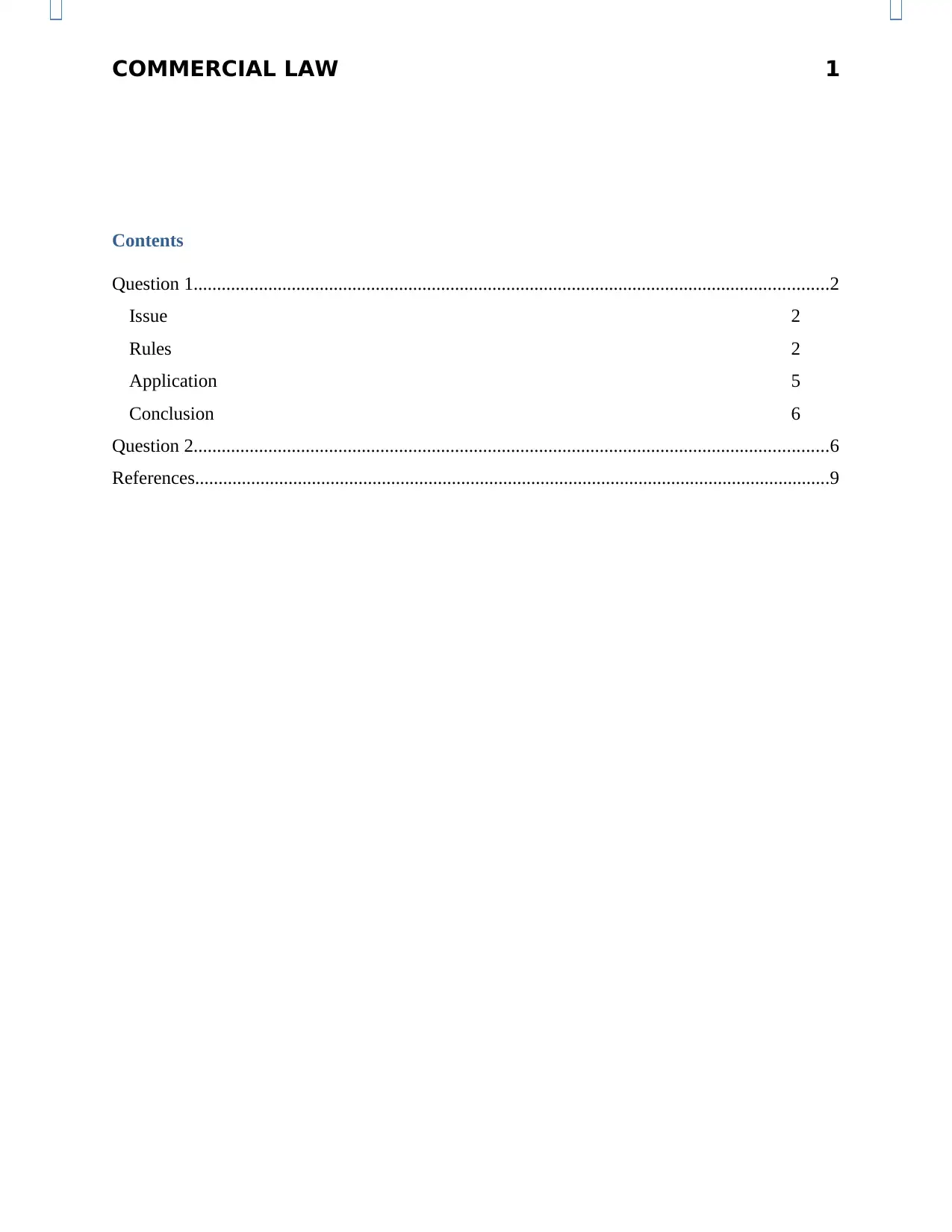
COMMERCIAL LAW 1
Contents
Question 1........................................................................................................................................2
Issue 2
Rules 2
Application 5
Conclusion 6
Question 2........................................................................................................................................6
References........................................................................................................................................9
Contents
Question 1........................................................................................................................................2
Issue 2
Rules 2
Application 5
Conclusion 6
Question 2........................................................................................................................................6
References........................................................................................................................................9
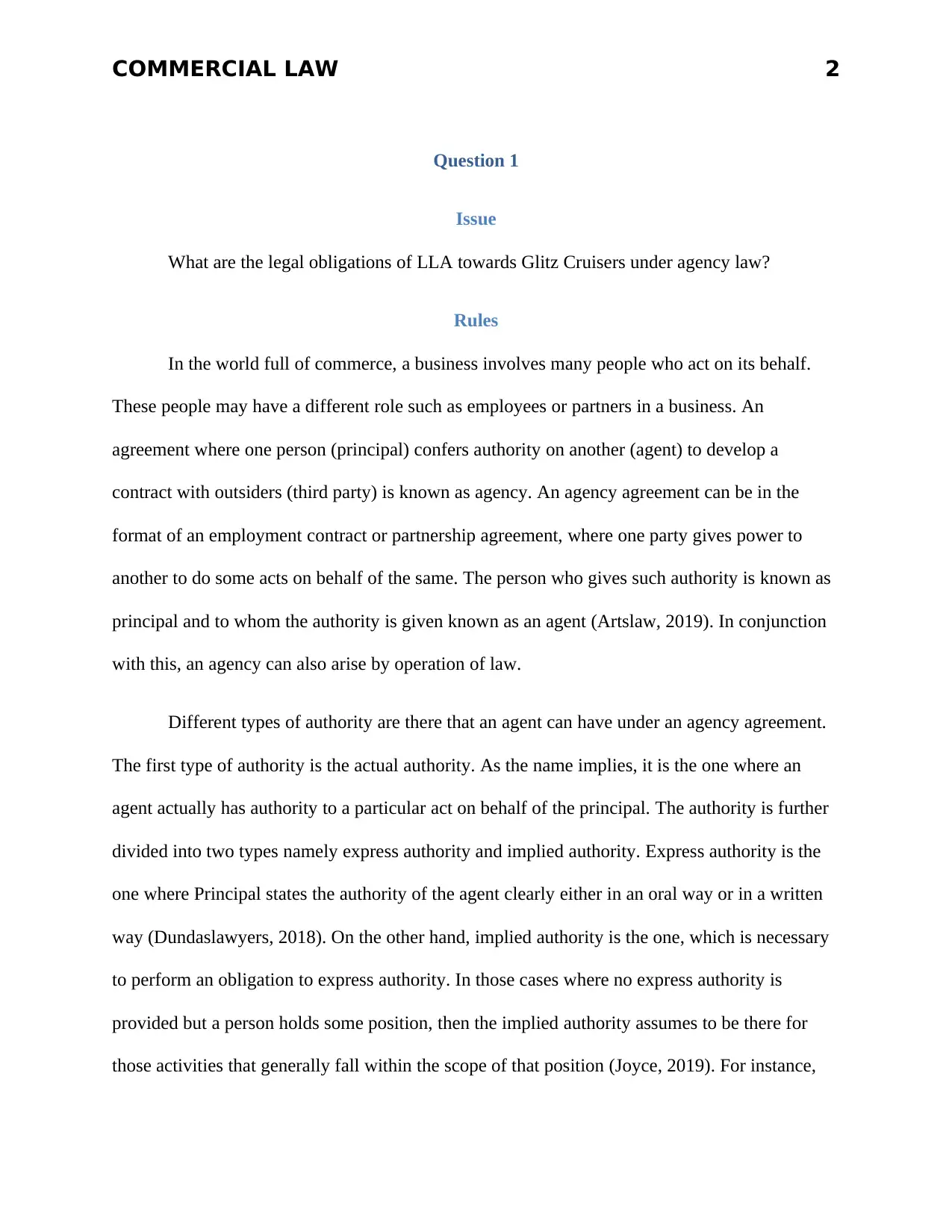
COMMERCIAL LAW 2
Question 1
Issue
What are the legal obligations of LLA towards Glitz Cruisers under agency law?
Rules
In the world full of commerce, a business involves many people who act on its behalf.
These people may have a different role such as employees or partners in a business. An
agreement where one person (principal) confers authority on another (agent) to develop a
contract with outsiders (third party) is known as agency. An agency agreement can be in the
format of an employment contract or partnership agreement, where one party gives power to
another to do some acts on behalf of the same. The person who gives such authority is known as
principal and to whom the authority is given known as an agent (Artslaw, 2019). In conjunction
with this, an agency can also arise by operation of law.
Different types of authority are there that an agent can have under an agency agreement.
The first type of authority is the actual authority. As the name implies, it is the one where an
agent actually has authority to a particular act on behalf of the principal. The authority is further
divided into two types namely express authority and implied authority. Express authority is the
one where Principal states the authority of the agent clearly either in an oral way or in a written
way (Dundaslawyers, 2018). On the other hand, implied authority is the one, which is necessary
to perform an obligation to express authority. In those cases where no express authority is
provided but a person holds some position, then the implied authority assumes to be there for
those activities that generally fall within the scope of that position (Joyce, 2019). For instance,
Question 1
Issue
What are the legal obligations of LLA towards Glitz Cruisers under agency law?
Rules
In the world full of commerce, a business involves many people who act on its behalf.
These people may have a different role such as employees or partners in a business. An
agreement where one person (principal) confers authority on another (agent) to develop a
contract with outsiders (third party) is known as agency. An agency agreement can be in the
format of an employment contract or partnership agreement, where one party gives power to
another to do some acts on behalf of the same. The person who gives such authority is known as
principal and to whom the authority is given known as an agent (Artslaw, 2019). In conjunction
with this, an agency can also arise by operation of law.
Different types of authority are there that an agent can have under an agency agreement.
The first type of authority is the actual authority. As the name implies, it is the one where an
agent actually has authority to a particular act on behalf of the principal. The authority is further
divided into two types namely express authority and implied authority. Express authority is the
one where Principal states the authority of the agent clearly either in an oral way or in a written
way (Dundaslawyers, 2018). On the other hand, implied authority is the one, which is necessary
to perform an obligation to express authority. In those cases where no express authority is
provided but a person holds some position, then the implied authority assumes to be there for
those activities that generally fall within the scope of that position (Joyce, 2019). For instance,
⊘ This is a preview!⊘
Do you want full access?
Subscribe today to unlock all pages.

Trusted by 1+ million students worldwide
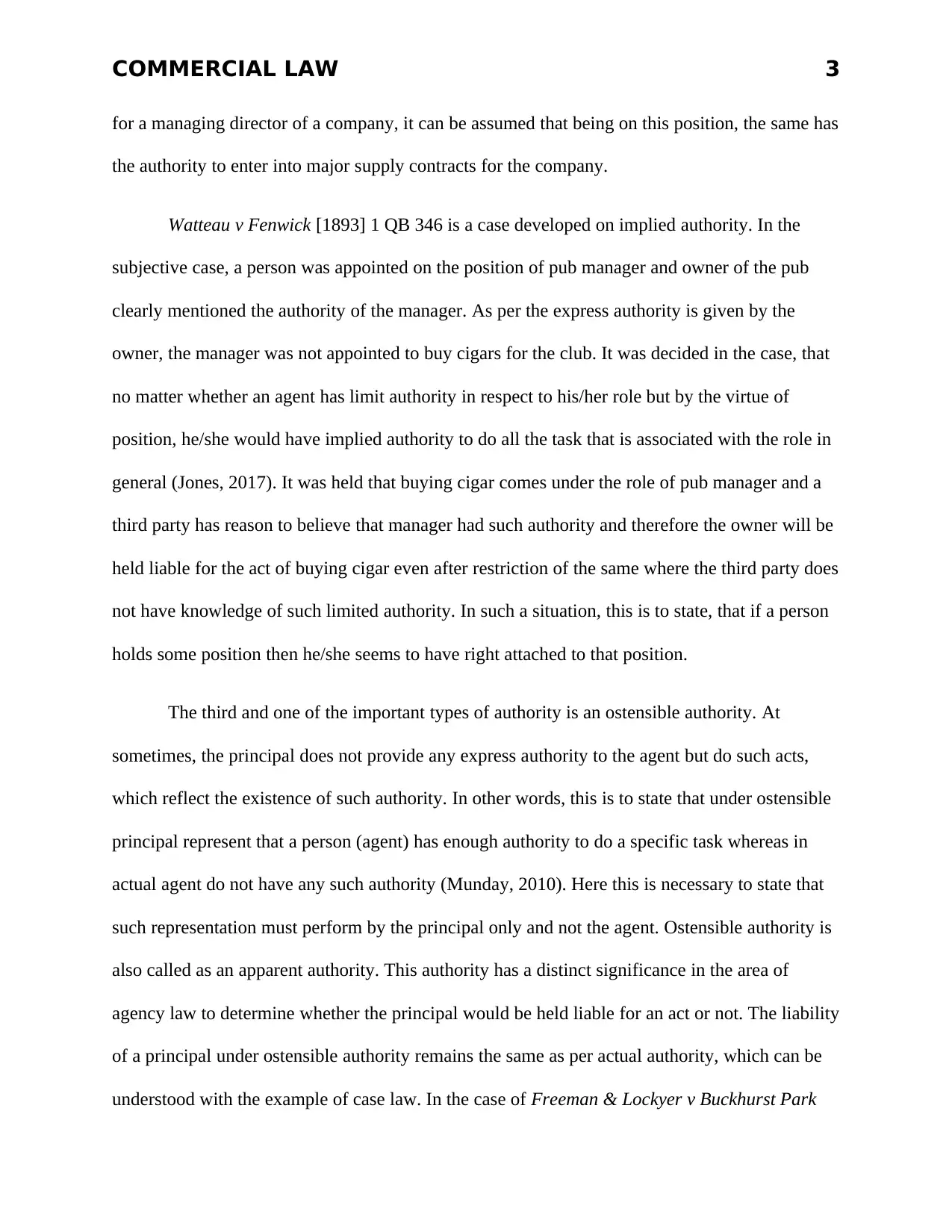
COMMERCIAL LAW 3
for a managing director of a company, it can be assumed that being on this position, the same has
the authority to enter into major supply contracts for the company.
Watteau v Fenwick [1893] 1 QB 346 is a case developed on implied authority. In the
subjective case, a person was appointed on the position of pub manager and owner of the pub
clearly mentioned the authority of the manager. As per the express authority is given by the
owner, the manager was not appointed to buy cigars for the club. It was decided in the case, that
no matter whether an agent has limit authority in respect to his/her role but by the virtue of
position, he/she would have implied authority to do all the task that is associated with the role in
general (Jones, 2017). It was held that buying cigar comes under the role of pub manager and a
third party has reason to believe that manager had such authority and therefore the owner will be
held liable for the act of buying cigar even after restriction of the same where the third party does
not have knowledge of such limited authority. In such a situation, this is to state, that if a person
holds some position then he/she seems to have right attached to that position.
The third and one of the important types of authority is an ostensible authority. At
sometimes, the principal does not provide any express authority to the agent but do such acts,
which reflect the existence of such authority. In other words, this is to state that under ostensible
principal represent that a person (agent) has enough authority to do a specific task whereas in
actual agent do not have any such authority (Munday, 2010). Here this is necessary to state that
such representation must perform by the principal only and not the agent. Ostensible authority is
also called as an apparent authority. This authority has a distinct significance in the area of
agency law to determine whether the principal would be held liable for an act or not. The liability
of a principal under ostensible authority remains the same as per actual authority, which can be
understood with the example of case law. In the case of Freeman & Lockyer v Buckhurst Park
for a managing director of a company, it can be assumed that being on this position, the same has
the authority to enter into major supply contracts for the company.
Watteau v Fenwick [1893] 1 QB 346 is a case developed on implied authority. In the
subjective case, a person was appointed on the position of pub manager and owner of the pub
clearly mentioned the authority of the manager. As per the express authority is given by the
owner, the manager was not appointed to buy cigars for the club. It was decided in the case, that
no matter whether an agent has limit authority in respect to his/her role but by the virtue of
position, he/she would have implied authority to do all the task that is associated with the role in
general (Jones, 2017). It was held that buying cigar comes under the role of pub manager and a
third party has reason to believe that manager had such authority and therefore the owner will be
held liable for the act of buying cigar even after restriction of the same where the third party does
not have knowledge of such limited authority. In such a situation, this is to state, that if a person
holds some position then he/she seems to have right attached to that position.
The third and one of the important types of authority is an ostensible authority. At
sometimes, the principal does not provide any express authority to the agent but do such acts,
which reflect the existence of such authority. In other words, this is to state that under ostensible
principal represent that a person (agent) has enough authority to do a specific task whereas in
actual agent do not have any such authority (Munday, 2010). Here this is necessary to state that
such representation must perform by the principal only and not the agent. Ostensible authority is
also called as an apparent authority. This authority has a distinct significance in the area of
agency law to determine whether the principal would be held liable for an act or not. The liability
of a principal under ostensible authority remains the same as per actual authority, which can be
understood with the example of case law. In the case of Freeman & Lockyer v Buckhurst Park
Paraphrase This Document
Need a fresh take? Get an instant paraphrase of this document with our AI Paraphraser
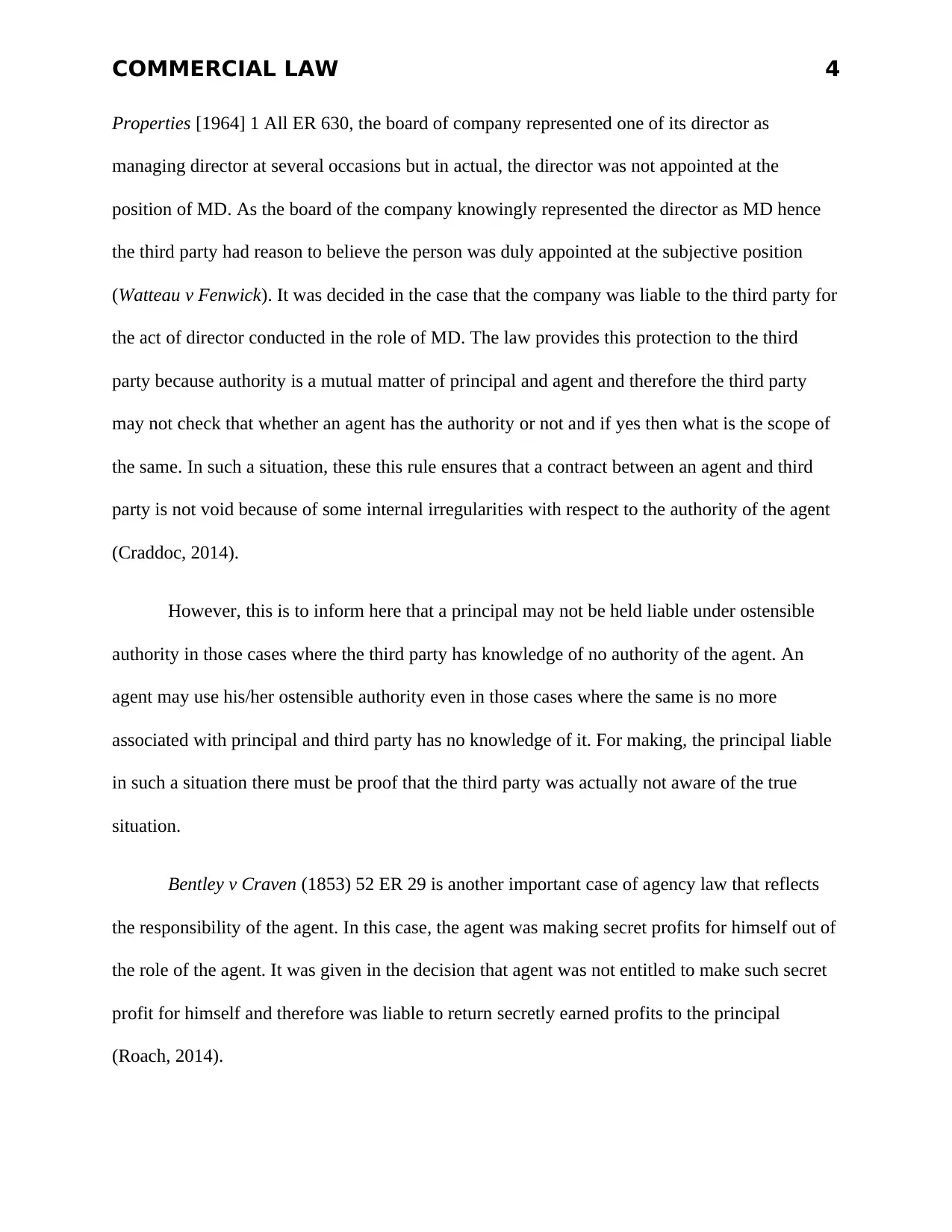
COMMERCIAL LAW 4
Properties [1964] 1 All ER 630, the board of company represented one of its director as
managing director at several occasions but in actual, the director was not appointed at the
position of MD. As the board of the company knowingly represented the director as MD hence
the third party had reason to believe the person was duly appointed at the subjective position
(Watteau v Fenwick). It was decided in the case that the company was liable to the third party for
the act of director conducted in the role of MD. The law provides this protection to the third
party because authority is a mutual matter of principal and agent and therefore the third party
may not check that whether an agent has the authority or not and if yes then what is the scope of
the same. In such a situation, these this rule ensures that a contract between an agent and third
party is not void because of some internal irregularities with respect to the authority of the agent
(Craddoc, 2014).
However, this is to inform here that a principal may not be held liable under ostensible
authority in those cases where the third party has knowledge of no authority of the agent. An
agent may use his/her ostensible authority even in those cases where the same is no more
associated with principal and third party has no knowledge of it. For making, the principal liable
in such a situation there must be proof that the third party was actually not aware of the true
situation.
Bentley v Craven (1853) 52 ER 29 is another important case of agency law that reflects
the responsibility of the agent. In this case, the agent was making secret profits for himself out of
the role of the agent. It was given in the decision that agent was not entitled to make such secret
profit for himself and therefore was liable to return secretly earned profits to the principal
(Roach, 2014).
Properties [1964] 1 All ER 630, the board of company represented one of its director as
managing director at several occasions but in actual, the director was not appointed at the
position of MD. As the board of the company knowingly represented the director as MD hence
the third party had reason to believe the person was duly appointed at the subjective position
(Watteau v Fenwick). It was decided in the case that the company was liable to the third party for
the act of director conducted in the role of MD. The law provides this protection to the third
party because authority is a mutual matter of principal and agent and therefore the third party
may not check that whether an agent has the authority or not and if yes then what is the scope of
the same. In such a situation, these this rule ensures that a contract between an agent and third
party is not void because of some internal irregularities with respect to the authority of the agent
(Craddoc, 2014).
However, this is to inform here that a principal may not be held liable under ostensible
authority in those cases where the third party has knowledge of no authority of the agent. An
agent may use his/her ostensible authority even in those cases where the same is no more
associated with principal and third party has no knowledge of it. For making, the principal liable
in such a situation there must be proof that the third party was actually not aware of the true
situation.
Bentley v Craven (1853) 52 ER 29 is another important case of agency law that reflects
the responsibility of the agent. In this case, the agent was making secret profits for himself out of
the role of the agent. It was given in the decision that agent was not entitled to make such secret
profit for himself and therefore was liable to return secretly earned profits to the principal
(Roach, 2014).
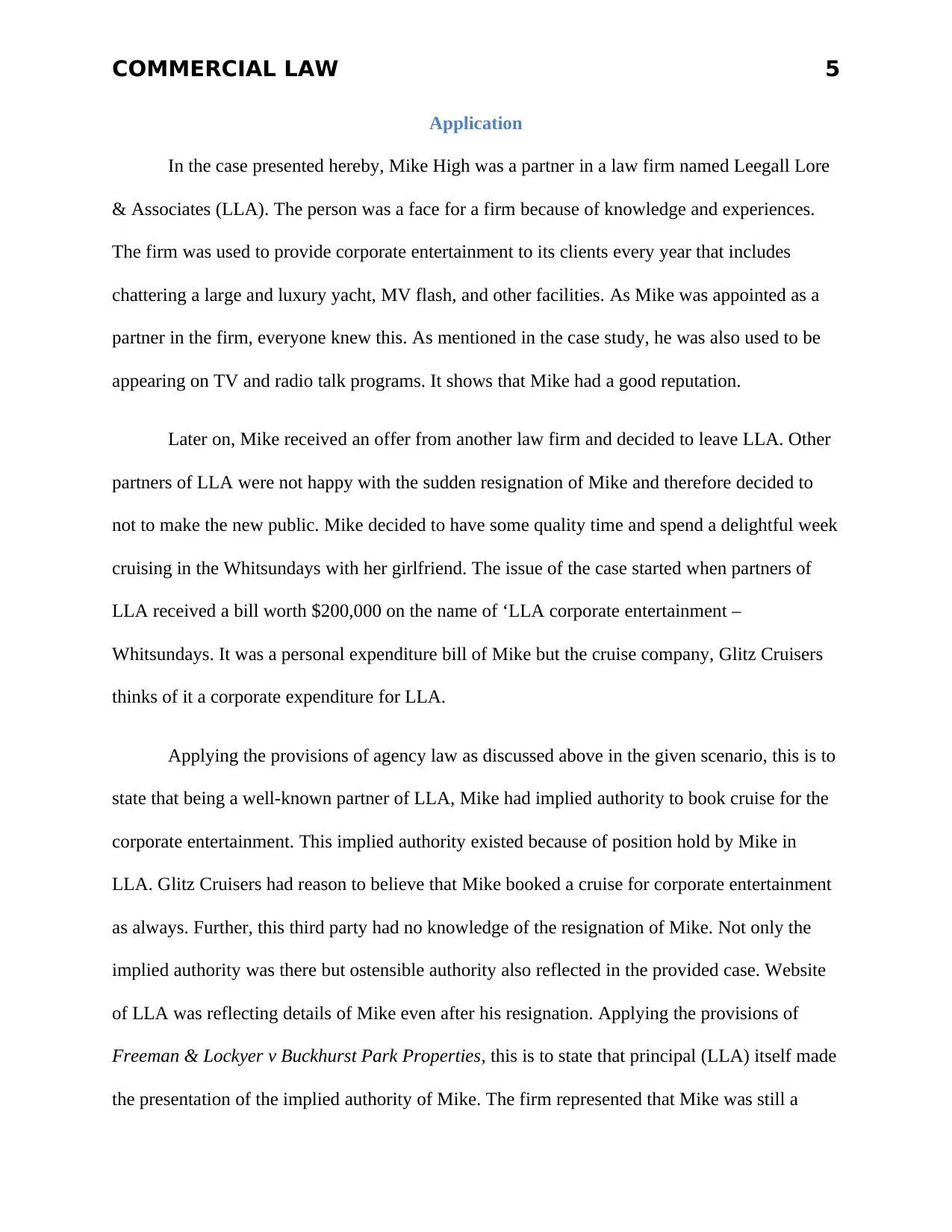
COMMERCIAL LAW 5
Application
In the case presented hereby, Mike High was a partner in a law firm named Leegall Lore
& Associates (LLA). The person was a face for a firm because of knowledge and experiences.
The firm was used to provide corporate entertainment to its clients every year that includes
chattering a large and luxury yacht, MV flash, and other facilities. As Mike was appointed as a
partner in the firm, everyone knew this. As mentioned in the case study, he was also used to be
appearing on TV and radio talk programs. It shows that Mike had a good reputation.
Later on, Mike received an offer from another law firm and decided to leave LLA. Other
partners of LLA were not happy with the sudden resignation of Mike and therefore decided to
not to make the new public. Mike decided to have some quality time and spend a delightful week
cruising in the Whitsundays with her girlfriend. The issue of the case started when partners of
LLA received a bill worth $200,000 on the name of ‘LLA corporate entertainment –
Whitsundays. It was a personal expenditure bill of Mike but the cruise company, Glitz Cruisers
thinks of it a corporate expenditure for LLA.
Applying the provisions of agency law as discussed above in the given scenario, this is to
state that being a well-known partner of LLA, Mike had implied authority to book cruise for the
corporate entertainment. This implied authority existed because of position hold by Mike in
LLA. Glitz Cruisers had reason to believe that Mike booked a cruise for corporate entertainment
as always. Further, this third party had no knowledge of the resignation of Mike. Not only the
implied authority was there but ostensible authority also reflected in the provided case. Website
of LLA was reflecting details of Mike even after his resignation. Applying the provisions of
Freeman & Lockyer v Buckhurst Park Properties, this is to state that principal (LLA) itself made
the presentation of the implied authority of Mike. The firm represented that Mike was still a
Application
In the case presented hereby, Mike High was a partner in a law firm named Leegall Lore
& Associates (LLA). The person was a face for a firm because of knowledge and experiences.
The firm was used to provide corporate entertainment to its clients every year that includes
chattering a large and luxury yacht, MV flash, and other facilities. As Mike was appointed as a
partner in the firm, everyone knew this. As mentioned in the case study, he was also used to be
appearing on TV and radio talk programs. It shows that Mike had a good reputation.
Later on, Mike received an offer from another law firm and decided to leave LLA. Other
partners of LLA were not happy with the sudden resignation of Mike and therefore decided to
not to make the new public. Mike decided to have some quality time and spend a delightful week
cruising in the Whitsundays with her girlfriend. The issue of the case started when partners of
LLA received a bill worth $200,000 on the name of ‘LLA corporate entertainment –
Whitsundays. It was a personal expenditure bill of Mike but the cruise company, Glitz Cruisers
thinks of it a corporate expenditure for LLA.
Applying the provisions of agency law as discussed above in the given scenario, this is to
state that being a well-known partner of LLA, Mike had implied authority to book cruise for the
corporate entertainment. This implied authority existed because of position hold by Mike in
LLA. Glitz Cruisers had reason to believe that Mike booked a cruise for corporate entertainment
as always. Further, this third party had no knowledge of the resignation of Mike. Not only the
implied authority was there but ostensible authority also reflected in the provided case. Website
of LLA was reflecting details of Mike even after his resignation. Applying the provisions of
Freeman & Lockyer v Buckhurst Park Properties, this is to state that principal (LLA) itself made
the presentation of the implied authority of Mike. The firm represented that Mike was still a
⊘ This is a preview!⊘
Do you want full access?
Subscribe today to unlock all pages.

Trusted by 1+ million students worldwide
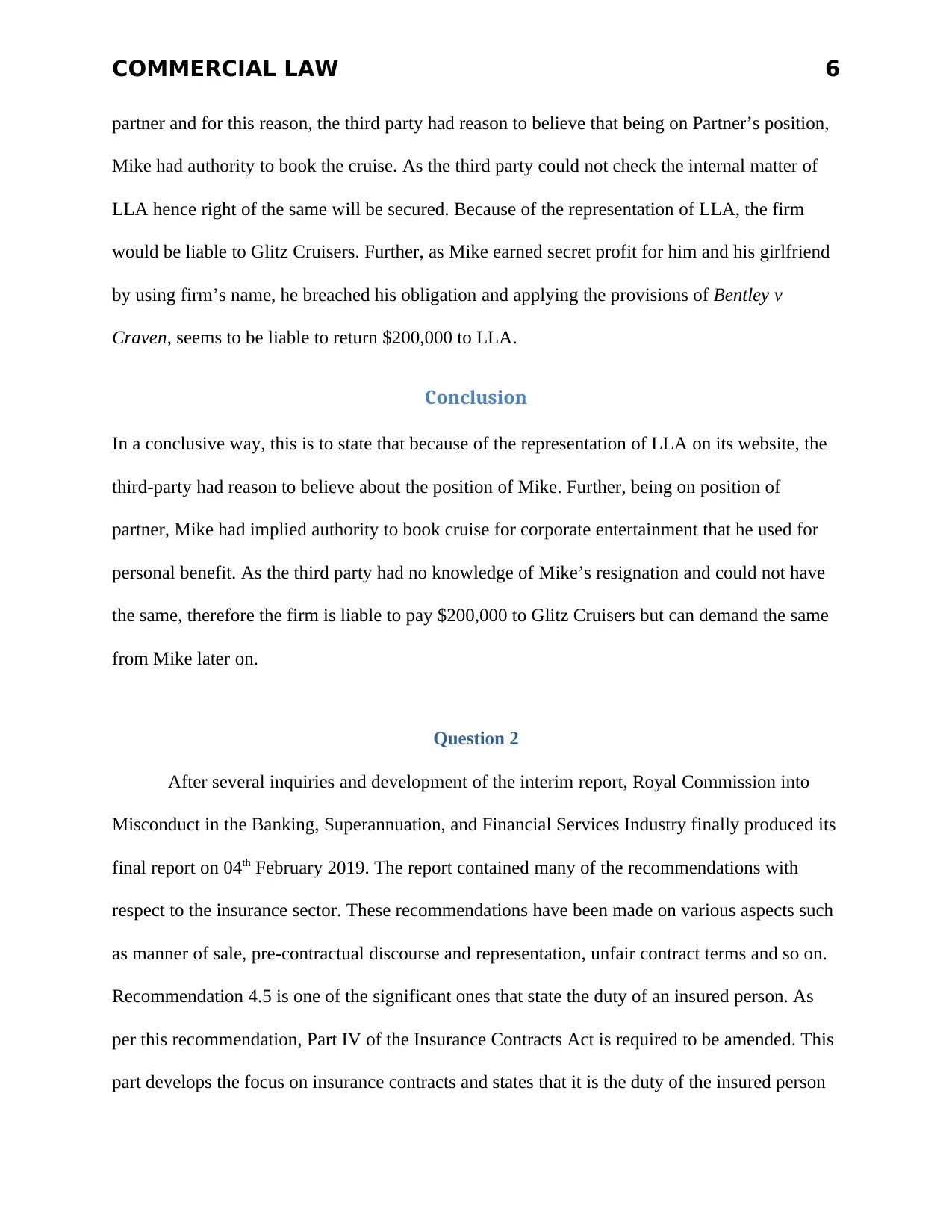
COMMERCIAL LAW 6
partner and for this reason, the third party had reason to believe that being on Partner’s position,
Mike had authority to book the cruise. As the third party could not check the internal matter of
LLA hence right of the same will be secured. Because of the representation of LLA, the firm
would be liable to Glitz Cruisers. Further, as Mike earned secret profit for him and his girlfriend
by using firm’s name, he breached his obligation and applying the provisions of Bentley v
Craven, seems to be liable to return $200,000 to LLA.
Conclusion
In a conclusive way, this is to state that because of the representation of LLA on its website, the
third-party had reason to believe about the position of Mike. Further, being on position of
partner, Mike had implied authority to book cruise for corporate entertainment that he used for
personal benefit. As the third party had no knowledge of Mike’s resignation and could not have
the same, therefore the firm is liable to pay $200,000 to Glitz Cruisers but can demand the same
from Mike later on.
Question 2
After several inquiries and development of the interim report, Royal Commission into
Misconduct in the Banking, Superannuation, and Financial Services Industry finally produced its
final report on 04th February 2019. The report contained many of the recommendations with
respect to the insurance sector. These recommendations have been made on various aspects such
as manner of sale, pre-contractual discourse and representation, unfair contract terms and so on.
Recommendation 4.5 is one of the significant ones that state the duty of an insured person. As
per this recommendation, Part IV of the Insurance Contracts Act is required to be amended. This
part develops the focus on insurance contracts and states that it is the duty of the insured person
partner and for this reason, the third party had reason to believe that being on Partner’s position,
Mike had authority to book the cruise. As the third party could not check the internal matter of
LLA hence right of the same will be secured. Because of the representation of LLA, the firm
would be liable to Glitz Cruisers. Further, as Mike earned secret profit for him and his girlfriend
by using firm’s name, he breached his obligation and applying the provisions of Bentley v
Craven, seems to be liable to return $200,000 to LLA.
Conclusion
In a conclusive way, this is to state that because of the representation of LLA on its website, the
third-party had reason to believe about the position of Mike. Further, being on position of
partner, Mike had implied authority to book cruise for corporate entertainment that he used for
personal benefit. As the third party had no knowledge of Mike’s resignation and could not have
the same, therefore the firm is liable to pay $200,000 to Glitz Cruisers but can demand the same
from Mike later on.
Question 2
After several inquiries and development of the interim report, Royal Commission into
Misconduct in the Banking, Superannuation, and Financial Services Industry finally produced its
final report on 04th February 2019. The report contained many of the recommendations with
respect to the insurance sector. These recommendations have been made on various aspects such
as manner of sale, pre-contractual discourse and representation, unfair contract terms and so on.
Recommendation 4.5 is one of the significant ones that state the duty of an insured person. As
per this recommendation, Part IV of the Insurance Contracts Act is required to be amended. This
part develops the focus on insurance contracts and states that it is the duty of the insured person
Paraphrase This Document
Need a fresh take? Get an instant paraphrase of this document with our AI Paraphraser
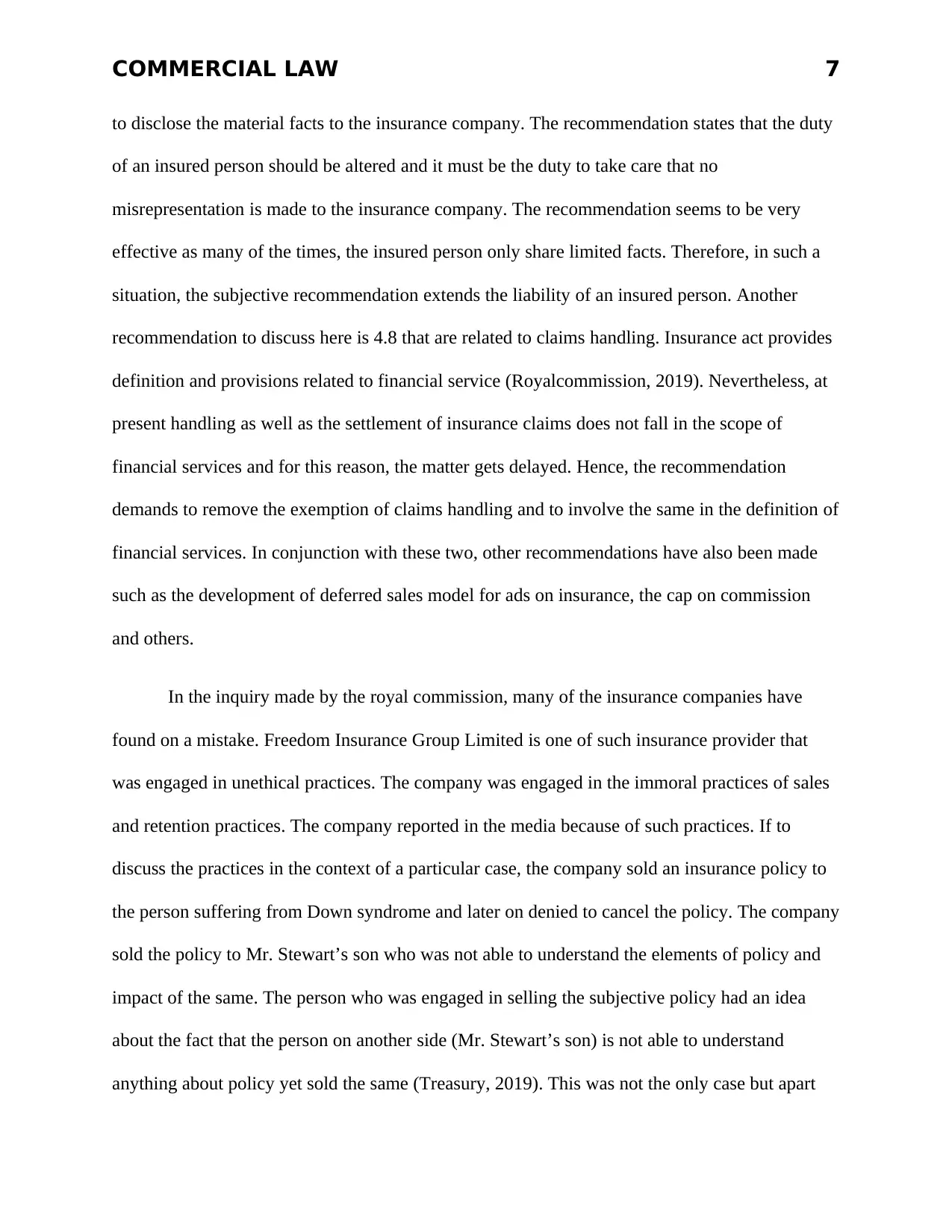
COMMERCIAL LAW 7
to disclose the material facts to the insurance company. The recommendation states that the duty
of an insured person should be altered and it must be the duty to take care that no
misrepresentation is made to the insurance company. The recommendation seems to be very
effective as many of the times, the insured person only share limited facts. Therefore, in such a
situation, the subjective recommendation extends the liability of an insured person. Another
recommendation to discuss here is 4.8 that are related to claims handling. Insurance act provides
definition and provisions related to financial service (Royalcommission, 2019). Nevertheless, at
present handling as well as the settlement of insurance claims does not fall in the scope of
financial services and for this reason, the matter gets delayed. Hence, the recommendation
demands to remove the exemption of claims handling and to involve the same in the definition of
financial services. In conjunction with these two, other recommendations have also been made
such as the development of deferred sales model for ads on insurance, the cap on commission
and others.
In the inquiry made by the royal commission, many of the insurance companies have
found on a mistake. Freedom Insurance Group Limited is one of such insurance provider that
was engaged in unethical practices. The company was engaged in the immoral practices of sales
and retention practices. The company reported in the media because of such practices. If to
discuss the practices in the context of a particular case, the company sold an insurance policy to
the person suffering from Down syndrome and later on denied to cancel the policy. The company
sold the policy to Mr. Stewart’s son who was not able to understand the elements of policy and
impact of the same. The person who was engaged in selling the subjective policy had an idea
about the fact that the person on another side (Mr. Stewart’s son) is not able to understand
anything about policy yet sold the same (Treasury, 2019). This was not the only case but apart
to disclose the material facts to the insurance company. The recommendation states that the duty
of an insured person should be altered and it must be the duty to take care that no
misrepresentation is made to the insurance company. The recommendation seems to be very
effective as many of the times, the insured person only share limited facts. Therefore, in such a
situation, the subjective recommendation extends the liability of an insured person. Another
recommendation to discuss here is 4.8 that are related to claims handling. Insurance act provides
definition and provisions related to financial service (Royalcommission, 2019). Nevertheless, at
present handling as well as the settlement of insurance claims does not fall in the scope of
financial services and for this reason, the matter gets delayed. Hence, the recommendation
demands to remove the exemption of claims handling and to involve the same in the definition of
financial services. In conjunction with these two, other recommendations have also been made
such as the development of deferred sales model for ads on insurance, the cap on commission
and others.
In the inquiry made by the royal commission, many of the insurance companies have
found on a mistake. Freedom Insurance Group Limited is one of such insurance provider that
was engaged in unethical practices. The company was engaged in the immoral practices of sales
and retention practices. The company reported in the media because of such practices. If to
discuss the practices in the context of a particular case, the company sold an insurance policy to
the person suffering from Down syndrome and later on denied to cancel the policy. The company
sold the policy to Mr. Stewart’s son who was not able to understand the elements of policy and
impact of the same. The person who was engaged in selling the subjective policy had an idea
about the fact that the person on another side (Mr. Stewart’s son) is not able to understand
anything about policy yet sold the same (Treasury, 2019). This was not the only case but apart
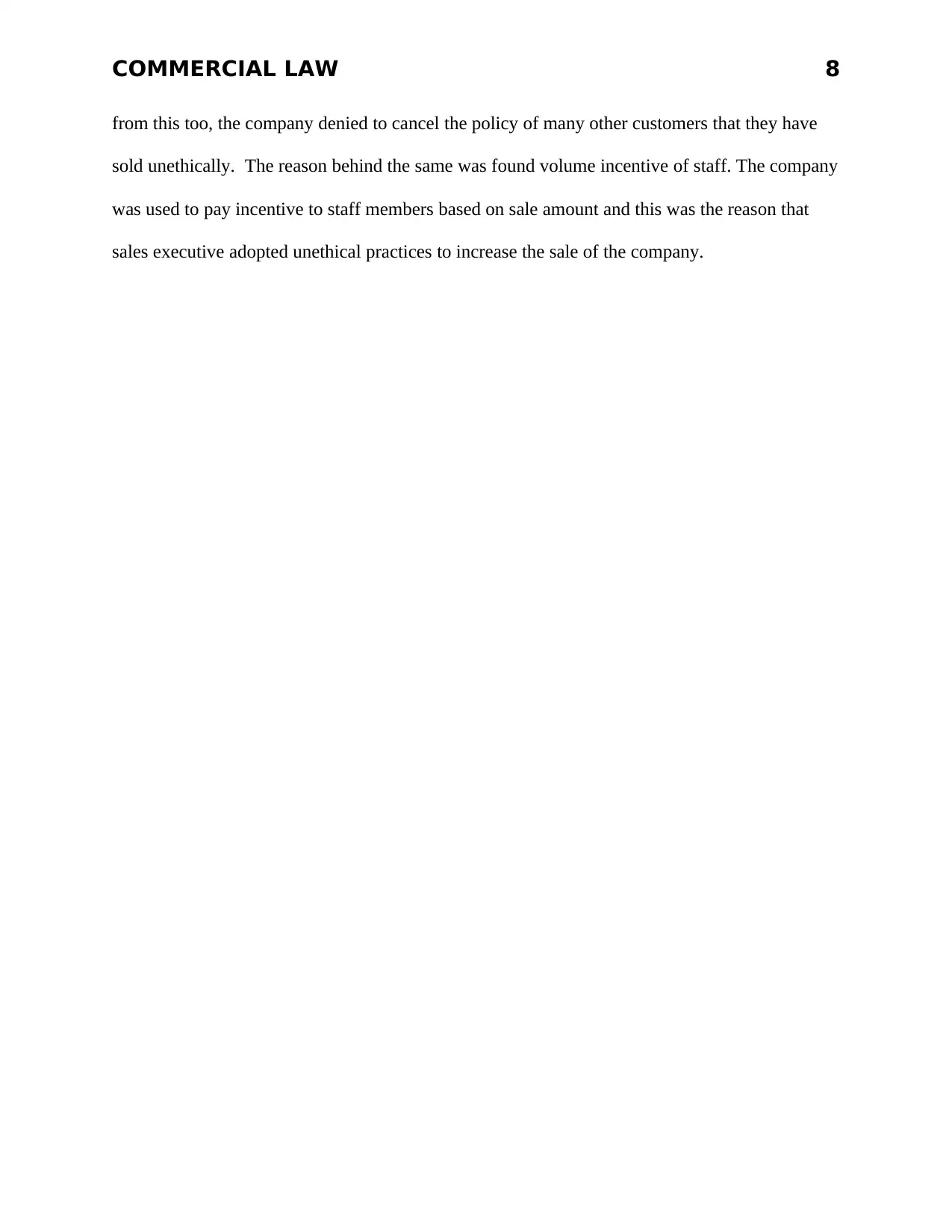
COMMERCIAL LAW 8
from this too, the company denied to cancel the policy of many other customers that they have
sold unethically. The reason behind the same was found volume incentive of staff. The company
was used to pay incentive to staff members based on sale amount and this was the reason that
sales executive adopted unethical practices to increase the sale of the company.
from this too, the company denied to cancel the policy of many other customers that they have
sold unethically. The reason behind the same was found volume incentive of staff. The company
was used to pay incentive to staff members based on sale amount and this was the reason that
sales executive adopted unethical practices to increase the sale of the company.
⊘ This is a preview!⊘
Do you want full access?
Subscribe today to unlock all pages.

Trusted by 1+ million students worldwide
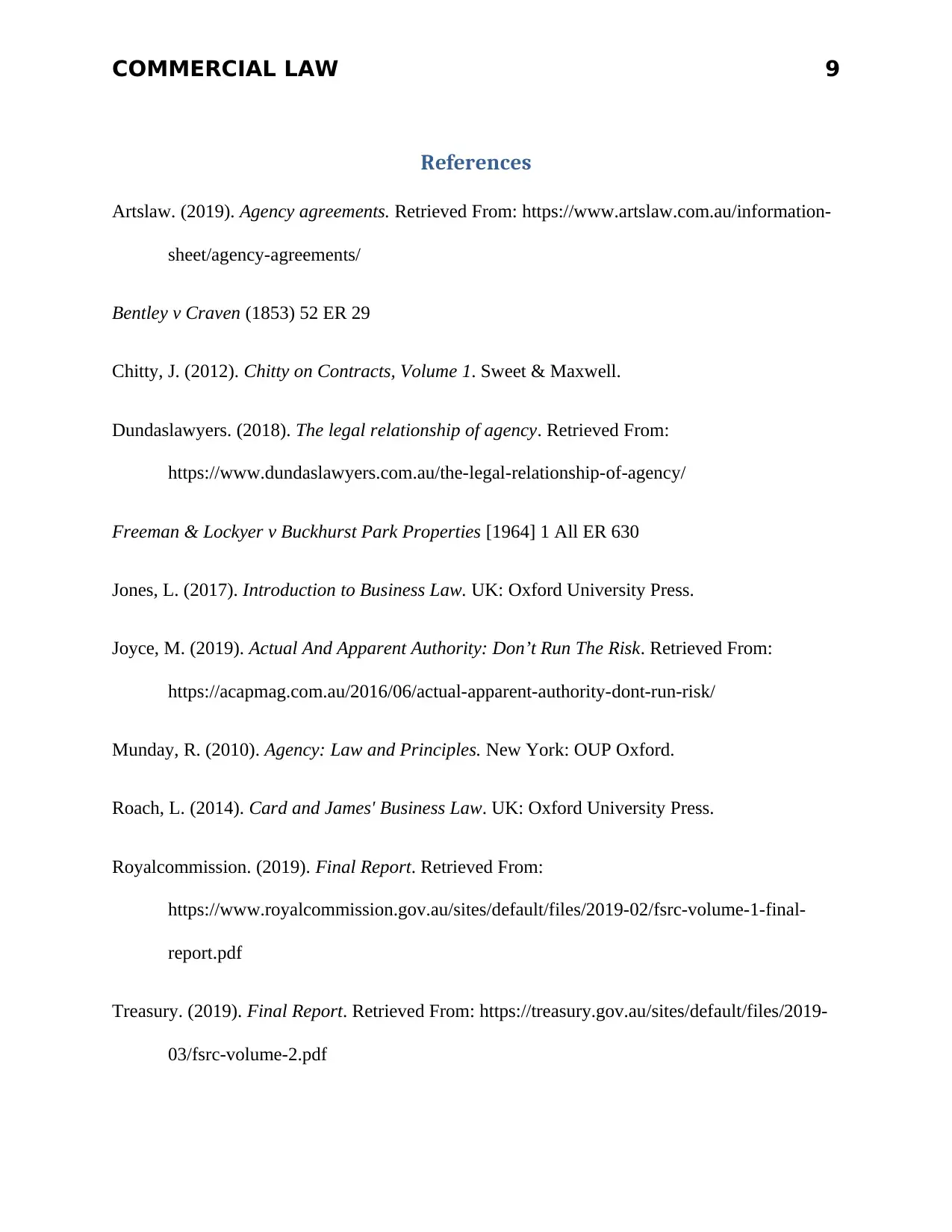
COMMERCIAL LAW 9
References
Artslaw. (2019). Agency agreements. Retrieved From: https://www.artslaw.com.au/information-
sheet/agency-agreements/
Bentley v Craven (1853) 52 ER 29
Chitty, J. (2012). Chitty on Contracts, Volume 1. Sweet & Maxwell.
Dundaslawyers. (2018). The legal relationship of agency. Retrieved From:
https://www.dundaslawyers.com.au/the-legal-relationship-of-agency/
Freeman & Lockyer v Buckhurst Park Properties [1964] 1 All ER 630
Jones, L. (2017). Introduction to Business Law. UK: Oxford University Press.
Joyce, M. (2019). Actual And Apparent Authority: Don’t Run The Risk. Retrieved From:
https://acapmag.com.au/2016/06/actual-apparent-authority-dont-run-risk/
Munday, R. (2010). Agency: Law and Principles. New York: OUP Oxford.
Roach, L. (2014). Card and James' Business Law. UK: Oxford University Press.
Royalcommission. (2019). Final Report. Retrieved From:
https://www.royalcommission.gov.au/sites/default/files/2019-02/fsrc-volume-1-final-
report.pdf
Treasury. (2019). Final Report. Retrieved From: https://treasury.gov.au/sites/default/files/2019-
03/fsrc-volume-2.pdf
References
Artslaw. (2019). Agency agreements. Retrieved From: https://www.artslaw.com.au/information-
sheet/agency-agreements/
Bentley v Craven (1853) 52 ER 29
Chitty, J. (2012). Chitty on Contracts, Volume 1. Sweet & Maxwell.
Dundaslawyers. (2018). The legal relationship of agency. Retrieved From:
https://www.dundaslawyers.com.au/the-legal-relationship-of-agency/
Freeman & Lockyer v Buckhurst Park Properties [1964] 1 All ER 630
Jones, L. (2017). Introduction to Business Law. UK: Oxford University Press.
Joyce, M. (2019). Actual And Apparent Authority: Don’t Run The Risk. Retrieved From:
https://acapmag.com.au/2016/06/actual-apparent-authority-dont-run-risk/
Munday, R. (2010). Agency: Law and Principles. New York: OUP Oxford.
Roach, L. (2014). Card and James' Business Law. UK: Oxford University Press.
Royalcommission. (2019). Final Report. Retrieved From:
https://www.royalcommission.gov.au/sites/default/files/2019-02/fsrc-volume-1-final-
report.pdf
Treasury. (2019). Final Report. Retrieved From: https://treasury.gov.au/sites/default/files/2019-
03/fsrc-volume-2.pdf
Paraphrase This Document
Need a fresh take? Get an instant paraphrase of this document with our AI Paraphraser

COMMERCIAL LAW 10
Watteau v Fenwick [1893] 1 QB 346
Watteau v Fenwick [1893] 1 QB 346
1 out of 11
Related Documents
Your All-in-One AI-Powered Toolkit for Academic Success.
+13062052269
info@desklib.com
Available 24*7 on WhatsApp / Email
![[object Object]](/_next/static/media/star-bottom.7253800d.svg)
Unlock your academic potential
Copyright © 2020–2026 A2Z Services. All Rights Reserved. Developed and managed by ZUCOL.





